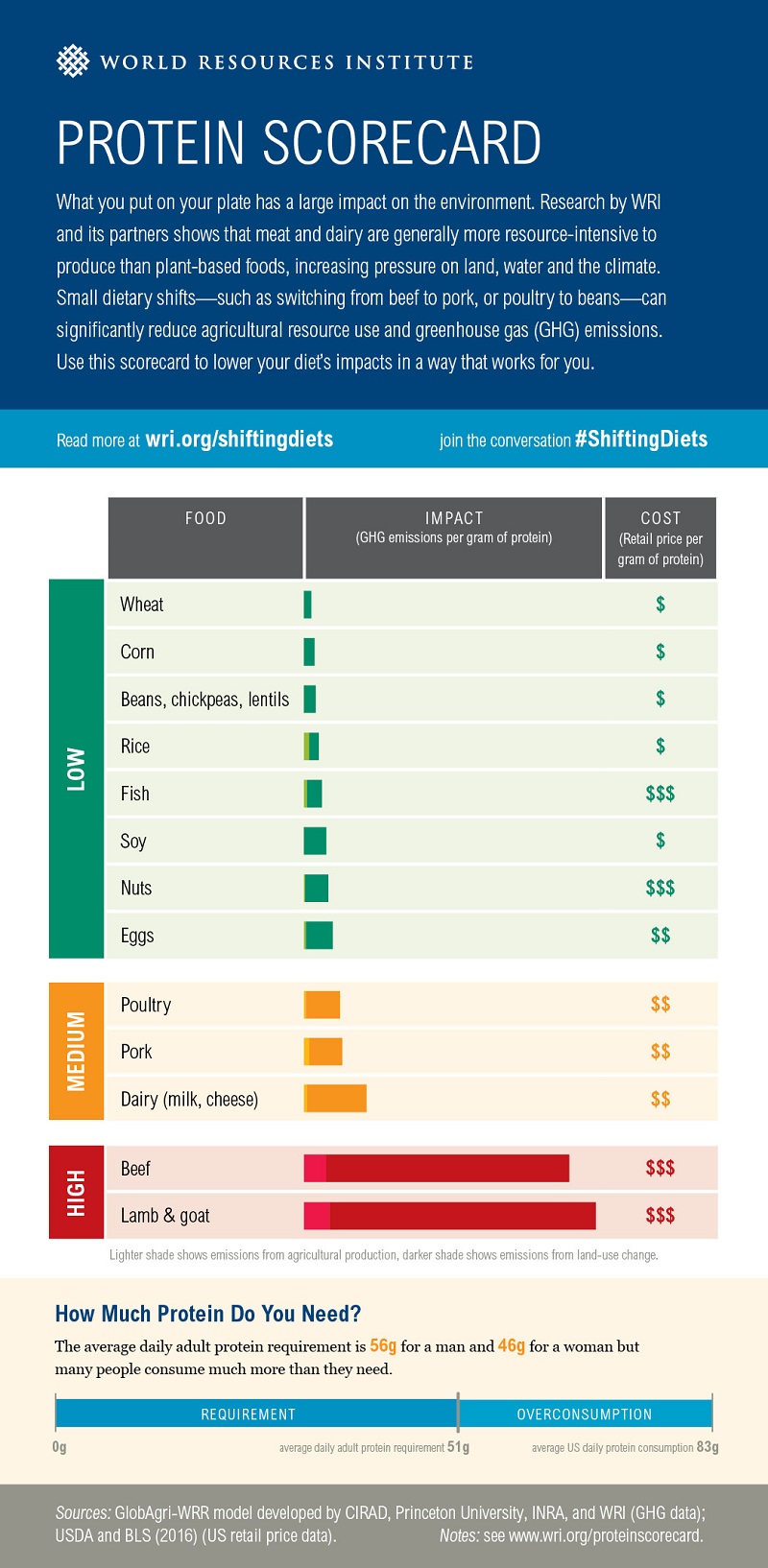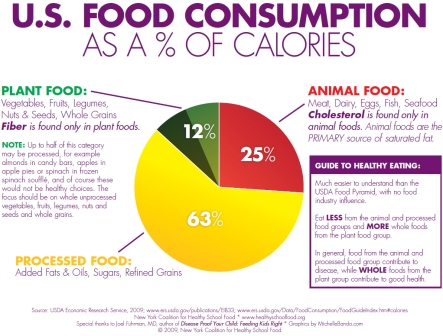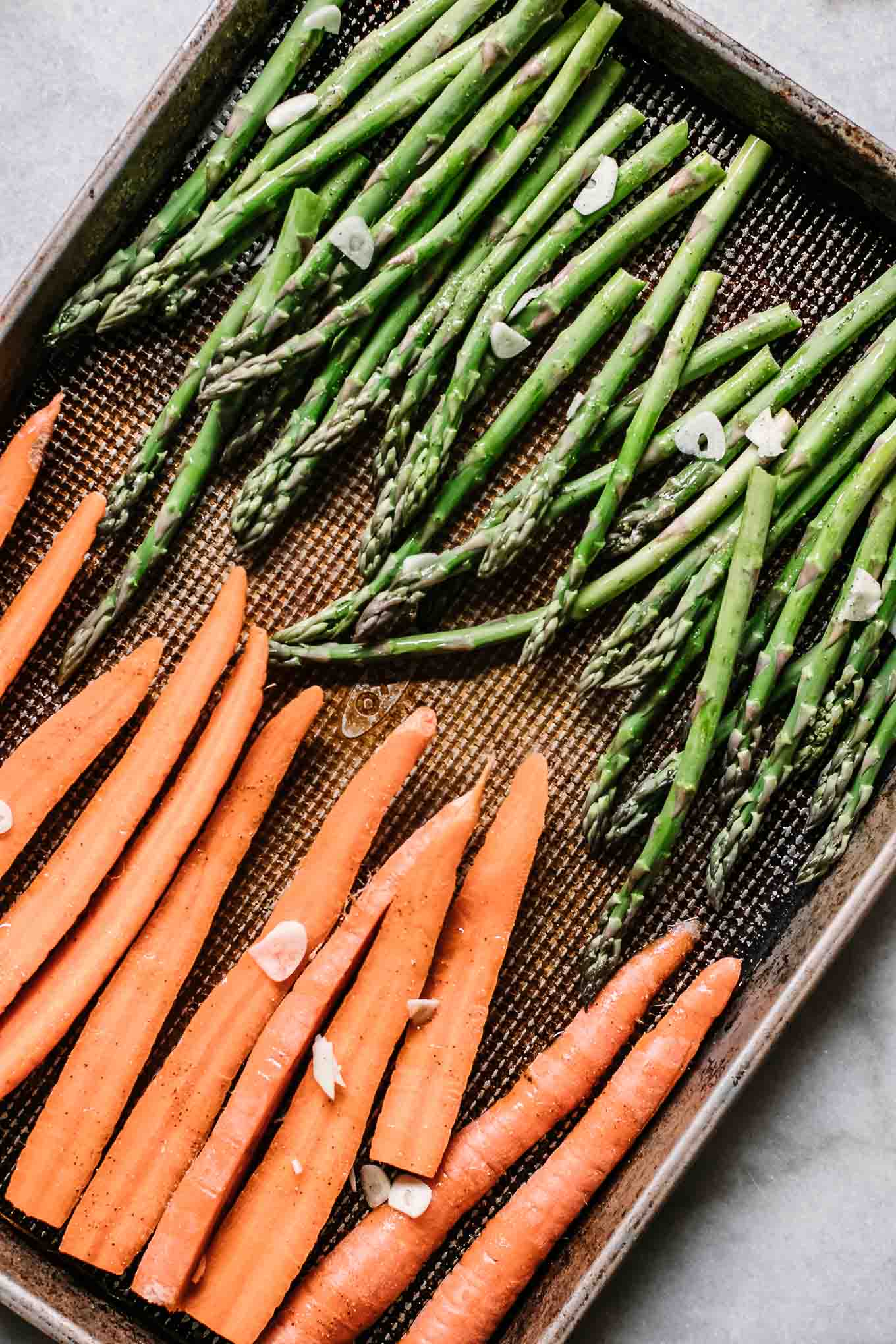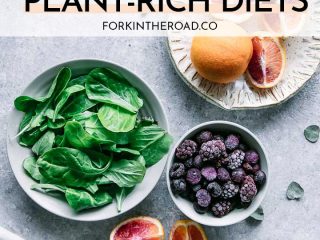Plant-Rich Diets: Good for You + Good for the Planet
Want to do your part to reduce climate change? Adopt a plant-rich diet! Shifting to an eating pattern rich in plants and low in animal-based foods reduces global warming and chronic disease — which means it’s good for you AND good for the planet.

Want to Save This Recipe?
Enter your email & I’ll send it to your inbox. Plus, get new plant-based recipes in your inbox!
By submitting this form, you consent to receive emails from Fork in the Road.
Diets rich in plants have long been touted for their health benefits. Historical figures such as Buddha, Confucius, Gandhi, and Da Vinci sang the praise of plant-based diets, and even modern-day food heroes like Michael Pollan have pushed plants as the foundation of healthy living.
Pollan’s often-repeated mantra, “Eat food. Not too much. Mostly plants.“, is the simple and easy to understand food motto we crave in our increasingly confusing food environment.
While the health benefits of plant-rich diets are agreed upon by nutrition professionals across the world, did you also know that adopting an eating pattern made up of mostly plant-based foods is also good for the environment?
👉 Let’s explore the many ways a diet rich in plants can be both good for you AND good for the planet.
🌍 The cost of our diet choices on the environment
Eating a diet rich in plant-based foods such as vegetables, fruits, whole grains, legumes, nuts, and seeds is one of the most impactful things you can do as an individual to cut your carbon footprint and reduce global warming.

👉 However, shifting to a plant-rich diet can be challenging as it is counterintuitive to the current mainstream Western diet, which is defined by overconsumption, highly processed foods, and is high in meat and animal-food products.
Unfortunately, these resource-intensive Western diets are on the rise — and not just in the proverbial “west”. We’re seeing a shift in many cultures across the world with traditionally plant-rich food cuisines toward meat and processed food-heavy diets.
This shift is referred to as the nutrition transition, and has seen rising chronic disease rates in countries like India, China, Mexico, and Brazil. Nutrition transition is quite literally changing the traditional food landscape globally.
In addition to rising rates of obesity and chronic disease, this shift toward a Western diet comes with a big climate price tag.

🐄 The role animal foods play in greenhouse gas emissions
According to the researchers behind the best-selling climate change book Drawdown:
“The most conservative estimates suggest that raising livestock accounts for nearly 15 percent of global greenhouse gases emitted each year; the most comprehensive assessments of direct and indirect emissions say more than 50 percent.”
Drawdown
In its list of 100 most impactful changes to reduce global warming, Drawdown lists plant-rich diets as number four behind wind turbines and reducing food waste.
While there are many ways that animal agriculture can change and innovate to drastically reduce its impact, the simple fact still remains that raising animals still produces more greenhouse gas emissions than plants.
Ruminant animals such as cows, sheep, and goats are the highest producers of methane gas (which is produced naturally as they digest their food) (source).
The following protein scorecard chart was released by the World Resources Institutes and shows the carbon impact of various plant and animal foods. Notice that most animal foods are in the medium to high offenders category, except fish and eggs.

In addition to the animal themselves releasing methane, the resources needed to sustain the animal agriculture status quo also produce high amounts of greenhouse gases.
The large amounts of land necessary to grow animals, the fertilizer needed to grow food for these animals, the manure produced, and the transportation associated with animal agriculture also contribute high amounts of toxic gases into our atmosphere.
“If cattle alone were their own nation, they would be the world’s third-largest emitter of greenhouse gases.”
Drawdown
🍔 The cost of our diet choices on our health
Over-consuming animal foods also comes with a big cost to human health. While today’s confusing nutrition marketing would have you believe that everyone needs more protein, the fact of the matter is that most people are actually getting much more protein than they actually need.
On average, healthy adults need about 50 grams of protein a day (or about 0.8 grams per kilogram of body weight). However, a study in 2009 estimated that the average adult is consuming 68 grams per day, which is 36% higher than what is needed.
In the US and Canada alone, the average adult consumes 90 grams of protein a day, more than double what they actually need.

Your body does not store more amino acids, the building blocks of protein, than it actually needs.
Consuming too much protein — just like consuming too many carbohydrates or dietary fats — means the unnecessary amino acids are converted to and stored as fat in the body.
There are times in life when more protein may be necessary, such as pregnancy, old age, during times of illness, or if you are a highly active person. But for the majority of healthy adults, more protein does NOT mean more health benefits (or more muscle, not matter what your bodybuilding friends tell you).
Besides an excess of protein, consuming an overabundance of animal products has also been shown to lead to certain cancers, strokes, and heart disease, which increase your chances of early death.
Over-consuming animal products can take a toll on your health, and not not to mention your wallet, from increased health care costs of chronic diseases.
When considering protein sources that are both healthy for you and for the environment, plant-rich foods are the clear winner.
🌱 Can plant-based diets provide the nutrients we need
It is possible to eat a diet rich in plants that is both nutritious and delicious, and choosing to fill your plate with mostly plants means you’re eating lower on the food chain and therefore reducing your personal carbon footprint.
👉 Shifting even small amounts of animal foods to plant-based proteins can make a big difference in your carbon footprint.
A recent study by Dr. Christopher Gardner of Stanford University found that decreasing total protein intake by 25% (remember, you’re likely eating too much!) and shifting 25% of animal foods to plant-based proteins would result in 40% fewer CO2 emissions and 10% less consumptive water use (source).
According the World Health Organization, only 10-15% of your diet needs to comes from protein, and a diet rich in mostly plants can help you meet that goal without drastically increasing your environmental impact.

🌱 What does the research say about plant-rich diets and planetary health?
Shifting to a plant-rich diets is the number one way that you as an individual can help to reduce global warming.
Studies and models on the link between nutritious, plant-based diets have continually shown that eating a diet rich in plants is one of the biggest to fight climate change, as well as living longer, healthier lives.
In 2016 the University of Oxford released a study that showed that a global shift to completely plant-based diets between now and 2050 will reduce current emissions by as much as 70%.
👉 However, even shifting to a vegetarian diet that still includes animal foods such as dairy and eggs will reduce emissions by 63%, as well as reduce deaths from diet-related diseases by up to 10%.
The World Resources Institute also released the Shifting Diets for a Sustainable Food Future report in 2016 that analyzed a variety of possible diet changes and found that reducing animal protein consumption in areas where people eat more than 60 grams of protein a day (hello, most of the Western world) holds the greatest promise for ensuring a sustainable future global food supply.
Which means that the food choice we make today will have a huge impact on the food available for future generations.
More recently, a landmark sustainable diet guide was released in January 2019 in partnership with the Stockholm Resilience Center‘s EAT Foundation and Lancet Journals, referred to as the EAT-Lancet Report.
This report was the first of its kind to model exactly what constitutes a healthy diet from a sustainable food system. The (not surprising) takeaway: plant-rich diets.

♻️ How can you and I do our part for a plant-forward future?
The case for plant-rich diets is undeniable, for both personal and planetary health.
Eating a diet with a lighter carbon footprint reduces greenhouse gases, but also tends to be a healthier option, which means you’re less likely to develop diet-related chronic diseases.
👉 However, it doesn’t mean that you have to completely give up meat and other animal foods to get the benefits of a plant-based diet. Instead, reframe the way meat fits into your diet; move meat from the center of your plate to be a side dish or even just a small flavor addition.
Consider meat a delicacy to be enjoyed the way sweets are: infrequently, or for special occasions. And get creative with plant-based foods by trying new flavors, herbs, and spices – the plant-rich possibilities are endless.

Want plant-rich recipe ideas?
In sum, making plants the superstars of your diet has the potential to literally change the world. What you put on your plate each and every time you eat is your way of standing up and making a change for a healthier you, and a healthier planet.
👉 Looking for more plant-centric recipes? Check out the Green Eating Recipe Index for simple, seasonal, plant-rich recipes!
❓ What are your favorite tips for shifting to a plant-rich diet? I’d love to hear your successes and challenges in the comments below!
♻️ Want more inspiration for going green in the kitchen? Join the Green Living Community for plant-based recipes, sustainable kitchen hacks, and get our FREE guide to meal planning to reduce food waste!
UPDATE: This article was originally published in April 2019 and was updated in October 2022.

